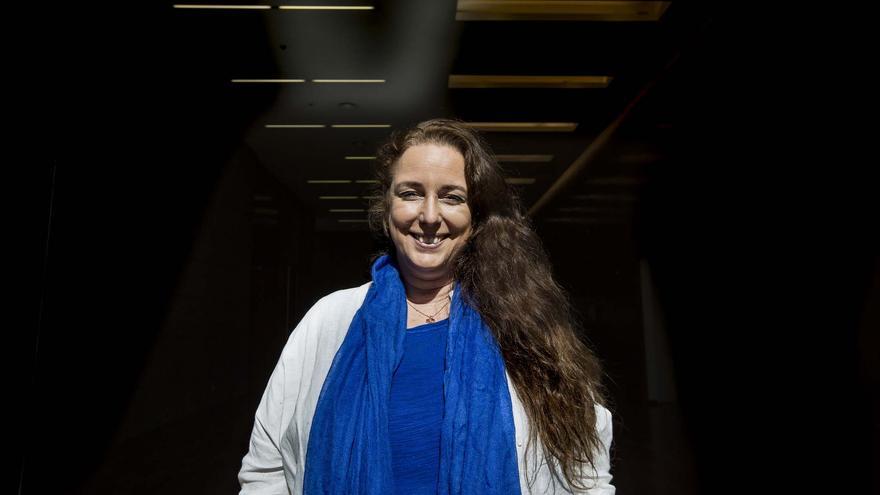
![]() 14ymedio, Madrid, 3 May 2023 — Cuban artist Tania Bruguera will return to Cuba in August. Or, at least, she will try, according to the Spanish newspaper La Vanguardia, which interviewed the activist during a visit to Barcelona where she participated in a conference on art and power at the Center for Contemporary Culture (CCCB).
14ymedio, Madrid, 3 May 2023 — Cuban artist Tania Bruguera will return to Cuba in August. Or, at least, she will try, according to the Spanish newspaper La Vanguardia, which interviewed the activist during a visit to Barcelona where she participated in a conference on art and power at the Center for Contemporary Culture (CCCB).
“They have let me know through a fellow activist that they are not going to let me in. But I always return, no matter what it costs me,” says the artist, who resides in Cambridge (USA), where she works as head of media and performance at Harvard University, and she warns: “Let them take note.”
Bruguera, who left Cuba in August 2021 after a negotiation for the Government to release twenty political prisoners, including rapper Maykel Osorbo Castillo and artist Hamlet Lavastida, accuses the regime of having agreed, in desperation, to that exchange with the sole intention of deporting her. “There was one protest action after another and they felt weakened. Many saw the departure of the artists as a defeat, but from that moment it has been the people who have taken the initiative for the protests. And that’s fantastic,” she argues.
The artist believes that the regime has reached a level of “impressive moral, political and social weakening” and believes that international public opinion should be aware of the situation and update its vision of Cuba. “It’s very uncomfortable for us that people continue to talk about Cuba as if the Revolution had just triumphed and was doing everything it promised,” she says.
Bruguera downplays the importance of the Government reading her interview with the Catalan newspaper, mentioning how fake news and profiles operate on the Island. “They watch my Facebook, how ridiculous, and there are also people who are dedicated to bullying me on social networks. They are more sophisticated about repression than people can imagine,” she warns.
The artist talks about her relationship with fear, a feeling with which she lives, especially minutes before and after carrying out a protest action. However, she argues, “what the dictatorship has not calculated is the power of the feeling that they are being unfair to you or to someone you love. That is a force greater than fear.”
She is also positive, because she remembers having engaged in activism alone while now “there is a whole generation willing to fight,” and she feels that fear has changed sides. “Those who lead us are so mediocre and have so much fear that they are not even able to sit at the table with people who think differently,” she emphasizes.
The artist, winner in 2021 of the Velázquez prize awarded by the Spanish Ministry of Culture, also addresses her relationship with art and dictatorships. Dictators, she says, perfectly understand the power of art to generate feelings and provoke sensations that they use for propaganda. She points out that songs by Silvio Rodríguez and Pablo Milanés are known in all latitudes. “[But] when artists use art to show reality, they stop them in a brutal way. Our greatest revenge is that dictatorships pass and art remains,” she says.
Her artistic experiences, which she talks about with La Vanguardia, are linked to her own body. In the performance of Autosabotaje, [Self-sabotage], she played Russian roulette with a real weapon. Bruguera confesses that after exposing her body in the most radical way possible in that performance, she promised not to do it again, although her artivism — as she calls her use of art to protest — has led her to compromise her physical integrity on many occasions.
“When in 2014 I went to the Plaza de la Revolución in Havana with the intention of putting up a microphone for any citizen to speak freely about the future of Cuba, it was somehow like putting a symbolic gun to my head. She was aware that it would have consequences, that she could never exhibit there again and that the confrontation was going up a level,” she says, recalling her performance of Tatlin’s Whisper*.
Despite this, the artist maintains that she resorts to performance because “it is a simple language, accessible to everyone. It is a medium very close to the theater because it uses a narrative, some bodies, but at the same time it opens a space for the unthinkable to happen and for the spectators to have the possibility of influencing what happens.”
In addition, she claims the speed of this mechanism helps to confront power. “When you make political art you have to be fast, so that the Government doesn’t have time to react or know what to do with you.”
*Translator’s note: Here is a link to video of a portion of that event.
Translated by Regina Anavy
____________
COLLABORATE WITH OUR WORK: The 14ymedio team is committed to practicing serious journalism that reflects Cuba’s reality in all its depth. Thank you for joining us on this long journey. We invite you to continue supporting us by becoming a member of 14ymedio now. Together we can continue transforming journalism in Cuba.
